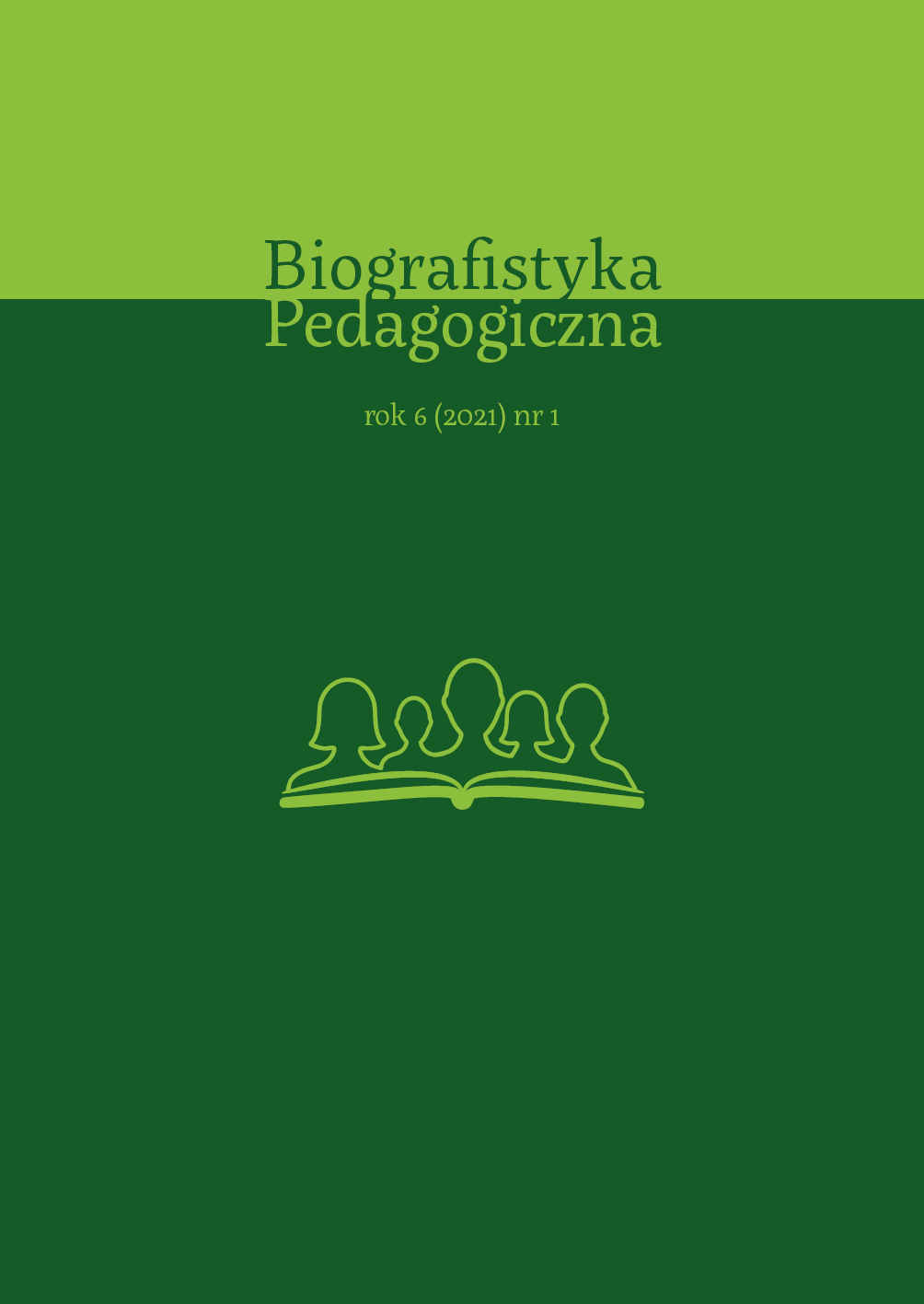Karl R. Popper i Ludwig Wittgenstein jako nauczyciele
Dwie biografie, dwie koncepcje filozofii edukacji
Abstrakt
Niniejszy artykuł poświęcony jest mniej znanym faktom z życia dwóch najsłynniejszych filozofów dwudziestowiecznych: Karlowi R. Popperowi i Ludwigowi Wittgensteinowi. Tekst ten dokonuje rekonstrukcji ich praktyki jako nauczycieli i umieszcza ten fakt w kontekście modelu filozofii edukacji przez nich prezentowanych w wybranych dziełach. Doświadczenie nauczycielskie cechuje w obu omawianych przypadkach wiele różnic pod wieloma względami, a różnice te służyć mogą prezentacji ich dzieł koncepcyjnych oraz tego, jak koncepcje te stosowali oni w praktyce. Artykuł ten przywołuje również kontekst reformy szkolnej wprowadzonej w Austrii w latach dwudziestych XX w. i odsłania w jakim stopniu wpłynęła ona na ich koncepcje edukacji i praktyczne jej zastosowanie w szkołach, w których pracowali.
Downloads
Bibliografia
Baker G., Wittgenstein's Method: Neglected Aspects, Hoboken 2006.
Bremer J., Ludwiga Wittgensteina teoria odwzorowania: w filozofii, mechanice, muzyce i architekturze, Kraków 2018.
Cavell S., Declining Decline: Wittgenstein As a Philosopher of Culture, „Inquiry: An Interdisciplinary Journal of Philosophy”, 31 (1988) nr 3, s. 253–264, DOI: 10.1080/00201748808602153.
Chitpin S., Leading school improvement: using Popper’s theory of learning, „Open Review of Educational Research”, 3 (2016) nr 1, s. 190-203, DOI: 10.1080/23265507.2016.1217742.
Cohen M., Philosophical Tales. Being an Alternative History Revealing the Characters, the Plots, and the Hidden Scenes That Make Up the True Story of Philosophy, Victoria 2008.
Conant J., Wittgenstein on Philosophy, Objectivity, and Meaning, Cambridge 2019.
Corson D., Popper on Education, „ACCESS: Contemporary Issues in Education”, 4 (1985) nr 2, s. 84–101.
Cuypers S. E; Martin, C., Reading R. S. Peters on Education Today, „Journal of Philosophy of Education”, 43 (2009) s. 3–7.
Diamond C., Reading Wittgenstein with Anscombe, Going On to Ethics, Cambridge 2019.
Döring E., Karl R. Popper. Einführung in Leben und Werk, Hamburg 1987.
Edmonds D., Edinow J., Pogrzebacz Wittgensteina. Opowieść o dziesięciominutowym sporze między dwoma wielkimi filozofami, tłum. L. Niedzielski, Warszawa 2002.
Fann K.T., Wittgenstein’s conception of philosophy, Oxford 1969.
Göttlicher W., Otto Glöckels Schulreform, das Rote Wien und die deutsche Reformpädagogik. Zur Einordnung der Glöckelschen Schulreform, 1919-1934, w: 1918 in Bildung und Erziehung Traditionen, Transitionen, Visionen, red. A. De Vincenti, N. Grube, A. Hoffmann-Ocon, Bad Heilbrunn 2020.
Hacohen M.H., Karl Popper – The Formative Years, 1902–1945: Politics and Philosophy in Interwar Vienna, Cambridge–New York 2000.
Holmboe C., A Wittgenstein Approach to the Learning of OO-modeling, „Computer Science Education”, 14 (2004) nr 4, s. 277-296, DOI: 10.1080/0899340042000303447.
Magee B., Popper, tłum. P. Dziliński, Warszawa 1998.
McGuinnes B., Wittgensteins frühe Jahre, Frankfurt am Main 1988.
Mendelski, T., Karl R. Popper. Metodolog czy ideolog?, Warszawa 1978.
Monk R., Ludwig Wittgenstein: The Duty of Genius, London 1991.
Musgrave A., Common Sense, Science and Scepticism: A Historical Introduction to the Theory of Knowledge, Cambridge 1993.
Parton, G., Bailey R., Problem-Based Learning: a Critical Rationalist Perspective, „London Review of Education”, 6 (2008) nr 3, s. 281–292, DOI:10.1080/14748460802528475.
Perloff M., Wittgenstein’s Ladder: Poetic Language and the Strangeness of the Ordinary, Chicago 1996.
Peters M. A., Subjectivity after Descartes: Wittgenstein as a Pedagogical Philosopher, w: A Companion to Wittgenstein on Education: Pedagogical Investigations, red. M.A. Peters, J. Stickney, Singapore 2017, s. 29–42.
Peters M.A., Marshall J., Wittgenstein: Philosophy, Postmodernism, Pedagogy, London 1999.
Popper K.R., Conjectures and Refutations: The Growth of Scientific Knowledge, New York 2002.
Popper K.R., Logika odkrycia naukowego, tłum. U. Niklas, Warszawa 2002.
Popper K.R., Nieustanne poszukiwania. Autobiografia intelektualna, tłum. A. Chmielewski, Kraków 1997.
Popper K.R., Objective Knowledge: An Evolutionary Approach, Oxford 1972.
Popper K.R., W poszukiwaniu lepszego świata: wykłady i rozprawy z trzydziestu lat, tłum. oraz przypisami opatrzył A. Malinowski, Warszawa 1997.
Ramsden P., Learning to Teach in Higher Education, New York 2003.
Ribeiro C., Karl Popper’s Conception of Metaphysics and its Problems, „Principia an International Journal of Epistemology”, 18 (2014) nr 2, s. 209–226, DOI: 10.5007/1808-1711.2014v18n2p209.
Sady W., Wittgenstein. Życie i dzieło, Lublin 1993.
Smit H., Popper and Wittgenstein on the Metaphysics of Experience, „Journal for General Philosophy of Science”, 46 (2015) s. 319–336.
Stadler F., The Vienna Circle: Studies in the Origins, Development and Influence of Logical Empiricism, Vienna 2015.
Wittgenstein in Cambridge. Letters and Documents 1911–1951, red. B. McGuinness, Malden–Oxford–Victoria 2008.
Wittgenstein L., Culture and Value, Chicago 2006.
Wittgenstein L., Philosophical Investigations, Oxford 1958.
Wittgenstein L., Tractatus logico-philosophicus, tłum. i wstęp B. Wolniewicz, Warszawa 1997.
Wittgenstein L., Uwagi o religii i etyce, tłum. M. Kawecka, W. Sady, W. Walentukiewicz, wprowadzenie W. Sady, Kraków 1995.
Copyright (c) 2021 Biografistyka Pedagogiczna

Utwór dostępny jest na licencji Creative Commons Uznanie autorstwa – Użycie niekomercyjne – Bez utworów zależnych 4.0 Międzynarodowe.


